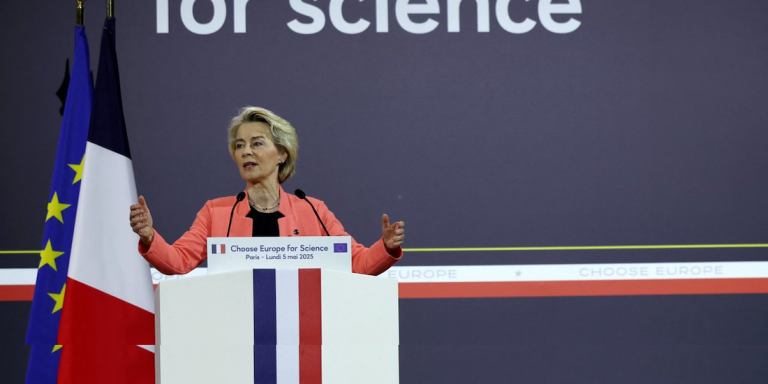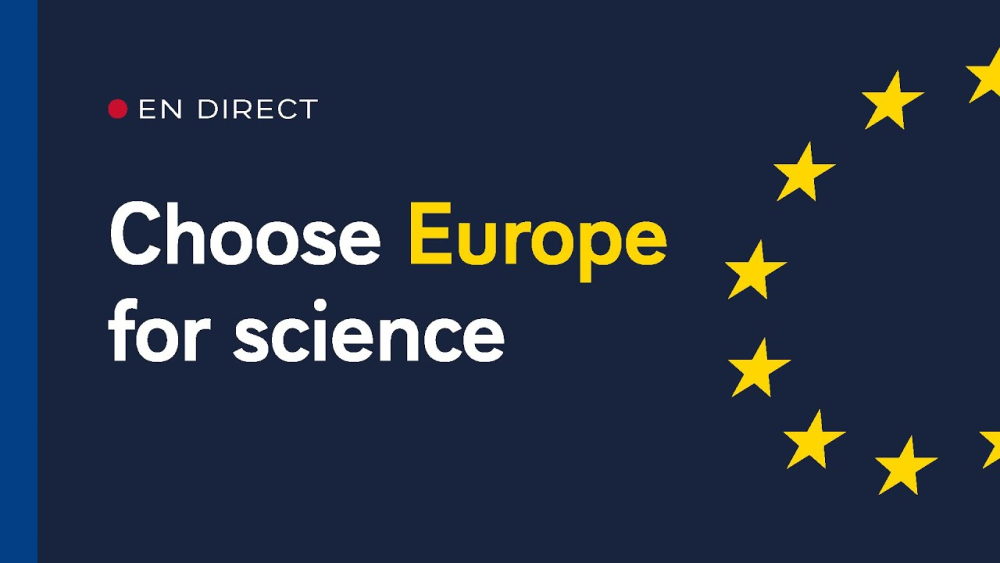
European Union launches €500 million initiative to draw researchers amid U.S. funding cuts and political tensions
Brussels – The European Union has unveiled a significant funding initiative aimed at attracting scientists and researchers from the United States and beyond, as U.S. universities face federal funding reductions and political pressures under the Trump administration.
On May 5, 2025, European Commission President Ursula von der Leyen announced a €500 million (approximately $566 million) package for 2025-2027 to strengthen Europe’s position as a global scientific hub and provide new incentives for researchers to relocate to the continent.
EU’s Strategic Investment in Science and Innovation

Speaking at the “Choose Europe for Science” conference held at Sorbonne University in Paris, von der Leyen emphasized that science is a crucial investment for economic growth and societal progress.
“We want scientists, researchers, and skilled professionals to select Europe,” she said. “Europe possesses all the essentials for scientific advancement. We offer stable and continuous investment, robust infrastructure, and a dedication to open and collaborative research.” The new funding package aims to transform Europe into an attractive destination for researchers by providing enhanced grants, infrastructure support, and career opportunities.
The initiative includes the creation of a seven-year “super grant” under the European Research Council (ERC), designed to offer longer-term funding and stability to top researchers relocating to Europe. The ERC will also double the support available to scientists moving to the EU in 2025, with plans to extend this increased support through.
U.S. Universities Under Pressure
The EU’s move comes amid growing challenges faced by American universities and research institutions under President Donald Trump’s administration.
Since taking office in January 2021, Trump has targeted
U.S. universities with funding freezes, visa restrictions on
international students, and investigations into academics.
Most recently, the Trump administration threatened to revoke the tax-exempt status of Harvard University, a move Harvard described as an unlawful politicization of the tax code.

Trump’s proposed 2026 federal budget calls for steep cuts to scientific funding, including a 56% reduction for the National Science Foundation and a 40% cut to the National Institutes of Health budget. These reductions have raised concerns about the future of U.S. scientific leadership and have prompted some researchers to consider opportunities abroad.
French President Emmanuel Macron, speaking alongside von der Leyen at the Paris event, called the U.S. administration’s approach a “colossal misjudgment” and urged the global scientific community to “cherish free and open science.” Macron also pledged an additional €100 million from France to support foreign researchers relocating to Europe.
Addressing the Talent Gap and Economic Competitiveness
Europe’s €500 million investment is part of a broader strategy to boost the continent’s research and development capabilities. The EU aims to increase member states’ investment in R&D to 3% of gross domestic product by 2030, a target von der Leyen highlighted during her speech. The funding will support research projects, help universities cover the costs of hosting foreign scientists, and foster innovation ecosystems across member countries14.
Despite Europe’s strengths in research infrastructure and quality of life, salaries for scientists have traditionally lagged behind U.S. levels. The new funding package seeks to close this gap and position Europe as a competitive alternative for top scientific talent. The initiative aligns with the goals of Horizon Europe, the EU’s flagship research and innovation program, which allocates nearly €93.5 billion for 2021-2027 to address global challenges and enhance European competitiveness.
Implications for Global Science Collaboration
The EU’s announcement underscores a growing geopolitical dimension to scientific research and innovation. By investing heavily in attracting international talent, Europe is signaling its intent to become a global leader in science, technology, and innovation. This move may accelerate a “brain drain” from the U.S. to Europe, especially among researchers frustrated by funding uncertainties and political interference in American academia.
Von der Leyen’s remarks hinted at the broader consequences of undermining free and open research, describing such actions as detrimental not only to science but to democratic societies. The EU’s commitment to open science principles and collaborative research contrasts sharply with the more restrictive policies emerging in the U.S..Europe’s €500 million pledge to lure scientists comes at a critical juncture for global research.
As U.S. universities grapple with funding cuts and political challenges, the EU is leveraging its resources and policy frameworks to attract top talent and strengthen its scientific ecosystem. This initiative reflects a strategic effort to enhance Europe’s innovation capacity, safeguard academic freedom, and maintain competitiveness in the rapidly evolving global knowledge economy.
Europe Pledges Half a Billion Euros to Attract Top Scientists (May 6, 2025)
#ChooseEuropeForScience #ScienceFunding #GlobalResearchTalent
Tags: Europe, Science Funding, Research Grants, U.S. Universities, Trump Administration,
European Research Council, Horizon Europe, Academic Freedom, Innovation

Social Media Blurbs
X (Twitter):
Europe pledges half a billion euros to attract top scientists amid U.S. funding cuts and political pressures. #ChooseEuropeForScience #ScienceFunding bit.ly/EuropeScience2025
Bluesky:
Europe announces a €500 million package to attract scientists as U.S. universities face funding cuts under Trump. A new era for global research collaboration. #ChooseEuropeForScience #ScienceFunding bit.ly/EuropeScience2025
LinkedIn:
The European Union has committed €500 million to attract scientists and researchers, responding to federal funding cuts and political challenges in U.S. academia under President Trump. This strategic investment aims to enhance Europe’s innovation capacity, support open science, and position the continent as a global leader in research. The initiative includes a new seven-year super grant and increased funding through the European Research Council. #ChooseEuropeForScience #ResearchFunding #InnovationLeadership
https://bit.ly/EuropeScience2025
Truth Social:
Europe pledges €500 million to attract scientists amid U.S. funding cuts and political pressures on universities. #ScienceFunding #ChooseEuropeForScience https://bit.ly/EuropeScience2025
Mastodon:
Europe launches a €500 million initiative to attract scientists worldwide as U.S. universities face funding cuts under Trump. This move aims to strengthen Europe’s research ecosystem and promote academic freedom. #ChooseEuropeForScience #ResearchInnovation https://bit.ly/EuropeScience2025
Instagram:
Europe pledges €500 million to attract top scientists amid U.S. funding cuts. Discover how this initiative aims to boost innovation and academic freedom. Learn more and join the conversation!
#ChooseEuropeForScience #ScienceFunding #ResearchGrants #Innovation #AcademicFreedom
Link in bio: bit.ly/EuropeScience2025
Facebook:
The European Union has announced a €500 million funding package to attract scientists from the U.S. and around the world, responding to federal funding cuts and political pressures under President Trump. This initiative aims to strengthen Europe’s research infrastructure and promote open science. Learn how Europe is positioning itself as a global leader in innovation. #ChooseEuropeForScience #ScienceFunding #ResearchInnovation https://bit.ly/EuropeScience2025
Reddit:
Europe pledges half a billion euros to attract top scientists amid U.S. funding cuts. How will this affect global scientific collaboration and the future of research? Could this lead to a brain drain from the U.S. to Europe? Join the discussion. #ScienceFunding #ChooseEuropeForScience https://bit.ly/EuropeScience2025